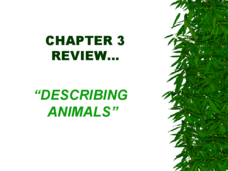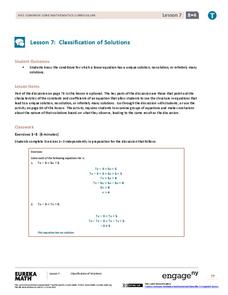Curated OER
Organizing Principles of Plants and Animals
Three lessons and five assessments are contained in this material. Various paper shapes are sorted as a simulation of biological classification. Learners gather a list of living things that they are familiar with and design a...
Curated OER
What Should You Know about Classification?
Many learners have a tough time picking out pertinent information from a text or in class. Sometimes, all it takes is a study/reading guide to show them the way. The worksheet here focuses on taxonomy and classification, including...
Curated OER
Classifying Pictures 2
Classification is the skill taught in this basic math worksheet. Kindergarteners examine four pictures in a row. They circle the picture that does not belong in the row with the other three pictures.
Curated OER
Sorting
Students examine the concepts of organization and classification. In this library skills lesson, students practice ordering and sorting skills by playing an interactive Internet game. Students then practice their classification skills in...
Curated OER
Hardware Sort
High schoolers work in groups to sort and classify a variety of hardware materials commonly found in the store. Students discuss attributes and explain their reasoning for different classifications.
Curated OER
Animal Categories
Students sort animal picture cards into classification groups such as mammals, reptiles, amphibians, insects and fish. They discuss the characteristics that each group of animals shares then arrange the pictures into a clasificatioon...
Curated OER
Classify Pictures
Classification is an important skill to learn. Here is a worksheet which invites learners to examine three pictures in a row. They circle the picture that does not belong in the row with the other two pictures.
Curated OER
Describing Animals
While a short review of animals and their classifications, this could be useful when discussing this topic in the classroom. There is a list of questions at the end to help review the main ideas. Reptiles, amphibians, and mammals are...
Curated OER
How Plants are Named
Genus and species are the 2 categories from which the plant classifications are derived and combined to create a scientific name. The rules for capitalization and underlining are given in these clean and logical slides.
Curated OER
What Makes a Plant a Plant?
For a plant unit in your biology curriculum, here is a slide show that bestows the basics of plant structure, reproduction, and classification. The information is general. The main point of the lesson is to highlight what characterizes...
Curated OER
Family Lesson Plan
Kindergarteners discuss families with this resource. They talk about human families, explaining how they grow and change, and focus on vocabulary words. Then, they talk about animal families, discuss the vocabulary involved, and match...
Curated OER
At the Seaside
Encourage sorting and classification skills by asking, "What kinds of things are found at the seaside?" Kids sort objects by calling out the items found at the beach. They can choose from things like balls, dogs, bikinis, shells, and...
Curated OER
Running Out Of Time: Bloom’s Taxonomy Mixed with QAR
Dig into chapter 19 of Running Out of Time with questions covering each level of Bloom's Taxonomy. Learners read the text, respond to the questions in paragraph form, and then discuss the answers as a class.
Curated OER
Book Jacket Match: Practice with the Dewey Decimal Classification System
As a follow-up activity to being introduced to the Dewey Decimal Classification System, 3rd graders listen to poems from Jackie Mims Hopkins' book The Shelf Elf Helps Out and sort book jackets by category and call number.
EngageNY
Classification of Solutions
Is there one, none, or more? Through discussion or activity, scholars find the properties of an equation that will determine the number of solutions. They then use the properties discovered to figure out the number of solutions for a...
Curated OER
Harry Potter and the Prisoner of Azkaban: Bloom's Taxonomy
Take a moment in your Harry Potter unit to assess comprehension. Readers use knowledge gained for the text and from their own experience to answer seven questions based on events in chapters four and five of Harry Potter and the Prisoner...
Columbus City Schools
Get Your Organisms Organized
From large to small, show your class how to organize them all! Included within the guide is everything you need to take their knowledge of classification from the cellular to the species level. The worksheets focus on building vocabulary...
Curated OER
Animal Classification
Third graders differentiate between vertebrates and invertebrates, and identify the main characteristics of mammals, fish, reptiles, amphibians, and birds. They sort and categorize different types of balls, discuss the characteristics...
Intel
Insects: The Good, The Bad, The Ugly
What would the world be like with no insects? Ponder this question using a research-based STEM unit that encourages scholars to investigate insects from both a beneficial and hazardous perspective. They learn about insect behaviors,...
Curated OER
Animals Galore
A well-designed lesson plan which covers the characteristics of the animals found in the six animal groups is here for your young biologists. In it, learners divide up into six groups; the amphibians, reptiles, mammals, birds, fish, and...
Curated OER
Classification 1: Classification Scheme
Learners examine how many kinds of living things can be sorted into groups in many ways using various features to decide which things belong to which group and that classification schemes vary with purpose.
Curated OER
Classification of Animals
Sixth graders examine two-way classification systems using four mutually exclusive groups and two dimensions simultaneously. They then are given a set of plastic animals, asked to create a two-way classification system, then asked to...
Curated OER
Classification Number Two
A three-page quiz assessing budding biologists' understanding of classification. Middle-level learners may need a little additional time on this, but should be able to handle the concepts with ease.
PBS
Classification
Students explore classification skills used in scientific research. They classify a variety of objects in order to compare and contrast. In addition, they analyze previously collected data in order to place items into meaningful groups.
Other popular searches
- Taxonomy
- Bloom's Taxonomy
- Using Taxonomy
- Blooms Taxonomy
- Math Classification
- Animal Classifications
- Plant Classification
- Classifying Animals
- Classification of Animals
- Animal Kingdom
- Soil Classification
- Classification Keys

























